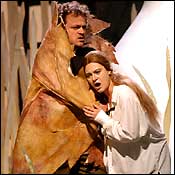
Part two of the Kirov Opera’s contribution to this summer’s Lincoln Center Festival brought us The Legend of the Invisible City of Kitezh and the Maiden Fevronia, Rimsky-Korsakov’s grandly scaled epic of an ancient city that magically vanished at the approach of invading Tartars—only the church spires and rooftops remained visible, reflected in the waters of Lake Svetly Yar. And while it may seem presumptuous to say so—the Kirov has been performing Kitezh ever since its world premiere in 1907—the company’s latest staging struck me as a horror.
Gorgeous and garrulous in about equal measure, Kitezh is popularly known as the Russian Parsifal because of its mystical nature, although both Rimsky-Korsakov’s pantheism and his tonal processes are about as far from Wagner as you can get. In the right production the longueurs don’t seem to matter much—this score becomes more spellbinding each time I hear it. The first magical notes depicting Fevronia’s ecstatic communion with nature set the tone, and true believers are sustained right up to the final apotheosis of the shimmering invisible city itself.
But this production, directed and designed by Dmitry Cherniakov, and quite different from the one the Kirov brought to BAM in 1995, is a postmodern affair that seems perversely determined to find the ugliest solution possible to every scenic challenge. The enchanted forest of Rimsky-Korsakov’s lush musical imagination is here depicted as an arid thicket of brown reeds sheltering giant-size jugs and washbasins, utensils evidently symbolizing Fevronia’s concern for the homeless. Myriad figures from Russia’s past and present populate Kitezh, surely a reflection of the opera’s all-encompassing nationalistic embrace, but the didactic points never register effectively amid sets that seem intentionally designed to alienate.
“Eugene Onegin is in every company’s repertory, but there is still nothing like seeing it done by natives totally in touch with the material.”
Fortunately, the musical picture was a lot more inviting under conductor Valery Gergiev, eloquently demonstrating just how the elegant shapes and warm colors of this ingeniously woven musical fabric differ from Parsifal. Two singers were especially distinctive—Mlada Khudolei as a radiant Fevronia, and Nikolai Gassiev, brilliant as the tortured Grishka Kuterma, whose betrayal of Kitezh into the hands of the enemy finally drives him mad. But it was the Kirov’s remarkable ensemble spirit that really made this Kitezh a memorable experience, despite the innumerable scenic distractions.
Apparently finding time on its hands and an evening to spare, the Kirov generously added a welcome Russian rarity to its schedule, a one-time-only concert performance of Anton Rubinstein’s The Demon. The opera may be a curio today, but for at least 50 years after its premiere in 1875 it was wildly popular, not only in Russia but also in Germany and Italy. This erotic, supernatural tale of a fallen angel who yearns for a beauteous Caucasian princess was considered racy stuff back when the Wagnerian vogue for doomed antiheroes was flourishing—both Lermontov’s narrative poem that provided the source and the opera itself were at first banned as sacrilegious. For that matter, Rubinstein was something of a demon himself, an indefatigable composer and piano virtuoso whose uncanny physical resemblance to Beethoven only added to his exciting cosmopolitan image.
The Demon has few stylistic traits that might identify it as distinctively Russian—unlike most of his contemporaries, Rubinstein never tried to give his music a strong nationalist character. Actually, the score as a whole is not much more than generic romanticism, but the final battle between flesh and the spirit is well worth waiting for, a heated love-hate duet that lasts some 25 minutes. The opera’s nonstop lyrical outpourings attracted many golden-age baritones (it was one of Feodor Chaliapin’s great roles) who left some impressive recordings of the work’s best moments; Yevgeny Nikitin isn’t quite in their league, but he gave an efficient account of the part under the ubiquitous Gergiev’s baton, while Marina Mescheriakova found Princess Tamara a far more congenial assignment than the Verdi heroines she sings at the Met.
The Kirov saved the best for last. Tchaikovsky’s Eugene Onegin is in every company’s repertory, but there is still nothing quite like seeing this lyrical masterpiece done by natives totally in touch with the material. The Kirov’s first cast was especially remarkable in that the two couples—Tatiana (Irina Mataeva) and Onegin (Vladimir Moroz), Olga (Ekaterina Semenchuk) and Lensky (Yevgeny Akimov)—appeared to be scarcely out of their teens. I’ll not soon forget the exquisite vocal and physical detail Mataeva brought to Tatiana’s painful all-night vigil as she writes her impulsive love letter to Onegin. The penny-plain production is not much to look at, but with singers like this, so consumed by the piece, who cares? Once again Gergiev was in charge of the orchestra, and his affectionate way with the score surely helped open doors to make this deeply moving performance possible.
I could only take in a brief sampling of the festival’s four-part Prokofiev Marathon in Alice Tully Hall, a survey of the complete piano sonatas and virtually all of the composer’s chamber music. More than a dozen hard-working members of Lincoln Center’s Chamber Music Society shared the duties in the two string quartets and various solo sonatas, but the busiest musician of all was Anne-Marie McDermott, who performed the nine piano sonatas. These works leave few expressive facets of the instrument unexplored, and they require a technique that can reproduce everything from a baby’s caress to passages of sledgehammer ferocity. From what I could hear in Nos. 1 and 5, McDermott’s equipment handily fills the bill, and her enthusiasm for the idiom is infectious. I was sorry not to hear her tackle the great trilogy of war sonatas, but her recordings of the entire series, soon to appear on the Arabesque label, will surely compensate.
Classical Music Listings
• Highlights
• Classical Music
• Opera
• Dance
• All Listings